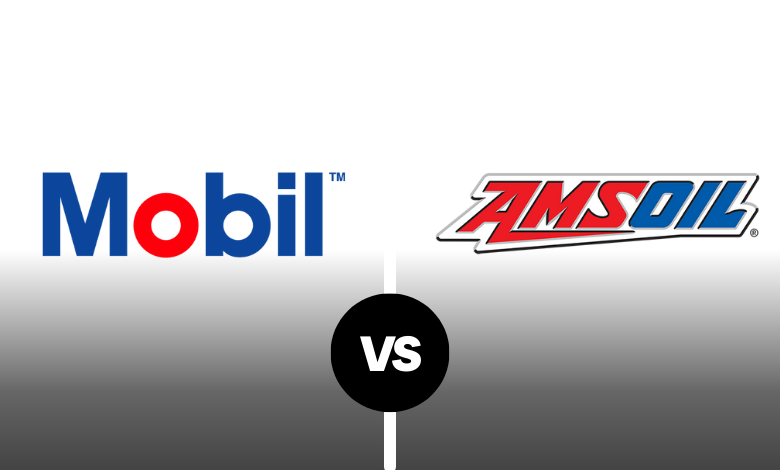Mobil 1 vs Amsoil

Mobil 1 vs Amsoil is an important debate for those who are more sensitive to their cars, even though it gives similar results in many areas. Mobil 1 synthetic motor oil outshone conventional oils due to its advanced formulation. It protects against metal-to-metal contact and wear, increasing fuel economy while simultaneously improving engine performance.
Amsoil synthetic motor oils offer superior protection in extreme conditions compared to conventional brands, featuring superior volatility and acid protection and boasting an increased Total Base Number (TBN) that neutralizes any harmful acids which lead to engine deposits. We will compare different features for Mobil 1 vs Amsoil. Just like Mobil 1 vs Valvoline, we will make a detailed comparison. However, we need to promote the products separately:
What is Mobil 1?
Mobil 1 synthetic motor oil offers superior engine protection over conventional oils. Constructed using a unique blend of base stocks combined with additives, Mobil 1 comes in various viscosities to suit different vehicle models.
Mobil 1 was the first engine lubricant to be test marketed as an advanced full-synthetic engine oil, using PAO basestock chemistry and boasting of increasing drain intervals by 50%.
AMSOIL outperformed Mobil 1 in all five key bench tests of engine oil performance: NOACK volatility, flash/fire point, pour point, four ball wear and total base number. In particular, AMSOIL Signature Series 5W-30 Synthetic Motor Oil produced fewer carbon deposits in standard deposit tests compared with Mobil 1 SuperSyn 5W-30 Motor Oil and Royal Purple API 5W-30 Motor Oil.
What is Amsoil?
Amsoil was established in the 1970s to offer premium synthetic lubricants that protect engine components while increasing fuel efficiency. Their shear-resistant base oil is combined with molecularly consistent additives to form an efficient film and reduce frictional wear at lower temperatures while helping keep engines clean and deposit-free for extended drive times. We ll make a comparison like in “Liqui Moly vs Castrol“.
Differences Between Mobil 1 vs Amsoil
Engine oil selection can vary significantly among drivers. While everyone may have their own preferences when it comes to selecting an oil brand, there are some key differences you should take into account before making your choice.
Engine oil plays a pivotal role in keeping your car running smoothly by protecting the engine from damage while keeping its moving parts lubricated and clean.
Increased horsepower demands more RPMs and can put additional strain on the engine and its components, necessitating premium motor oil capable of withstanding higher loads and shear forces such as Amsoil offers. Mobil 1 vs Amsoil are not dramatically different products from each other in terms of price.
The Total Base Number test provides a measure of lubricant’s reserve alkalinity that helps resist acid corrosion over extended periods. As evidenced in the graph below, Amsoil has a higher TBN than Mobil 1.
Amsoil synthetic motor oils offer superior protection in extreme conditions compared to conventional brands, featuring superior volatility and acid protection and boasting an increased Total Base Number (TBN) that neutralizes any harmful acids which lead to engine deposits.
Biodegradable oils from Carboline Oils are designed to be kind to both engines and the environment, without polluting waterways and contributing to environmental pollution. Furthermore, their products can last for 25,000 miles or one year between changes. It is enough to mention these for Mobil 1 vs Amsoil.
Can I Use Amsoil Instead of Mobil 1?
Amsoil produces some of the top engine oils on the market, with independent testing showing their oil’s ability to fight viscosity breakdown better than Mobil 1. This means longer protection of pistons and cams, translating to better fuel efficiency and extended engine life.
Their engine oil also prevents foaming and metal-to-metal contact during startup, helping your car maintain an ideal temperature, which is essential to long-term protection. Furthermore, its higher TBN (total base number) rating allows it to neutralize acid buildup while helping prevent deposits from building up in your engine.
Answering this question depends on both the vehicle you drive and how often its oil needs changing. In general, Amsoil motor oil should be changed every 25,000 miles or one year , much less often than Mobil 1’s recommended interval.
Can You Mix Mobil 1 and Amsoil?
While it is technically possible to mix Mobil 1 and Amsoil engine oils together, doing so is not advised. Both synthetic engine oils contain additives designed specifically for different purposes – AMSOIL engineers create products to meet certain performance criteria such as extended drain intervals, superior wear protection, temperature stability, cold-cranking viscosity and keeping engines clean and deposit-free – so mixing conventional oil will dilute their additives and compromise performance.
Both companies provide engine oil with various viscosity grades to suit any vehicle operating environment, but AMSOIL outshone Mobil in numerous bench tests performed by automotive experts: NOACK volatility, flash/fire point, pour point, four ball wear and total base number (TBN). This is a good example for Mobil 1 vs Amsoil. It also has better heat-resisting abilities and shearing forces resistance. Whichever brand you opt for, be sure to use only high quality products!
Which One Is Better: Mobil 1 vs Amsoil?
Mobil 1 and Amsoil both provide high-grade engine oil that provides complete vehicle protection, but there are a few differences for Mobil 1 vs Amsoil between the brands that make Mobil 1 superior: for instance, Mobil 1’s extreme condition handling capabilities outshone those of Amsoil; it also provided greater thermal and oxidation protection than its competitor.
Mobil 1 and Amsoil both deliver in tests conducted by independent laboratories. However, Amsoil edged ahead slightly when tested for four ball wear tests and fuel economy.
Overall, Amsoil provides superior performance for Mobil 1 vs Amsoil, but your decision should depend on your driving habits and the severity of the environment where you reside. Also take into account your service schedule and manufacturer recommendations; for instance a wheeler driven under extreme conditions may need shorter oil change intervals than one driven primarily on highway roads.
